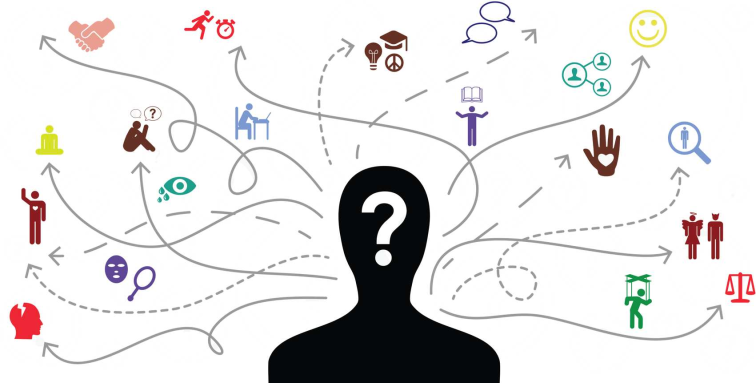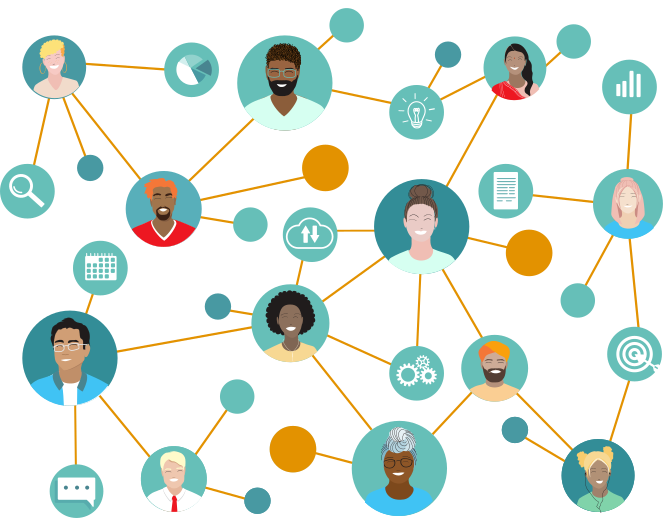They all want team success.
They just have different ways of getting there.
The Team Illuminator optimizes collaboration among colleagues globally
Overview
With the Team Illuminator, users can:

Take a self-assessment
and determine their preferences for interacting with others at work
and determine their preferences for interacting with others at work

Increase empathy,
understand what drives people’s workplace values and behaviors
understand what drives people’s workplace values and behaviors

Compare their values
to teammates, and determine optimal collaboration strategies
to teammates, and determine optimal collaboration strategies
Which factors influence values & behaviors?
Users identity what drives interactions in teams and organizations.
- Values
- Relationship/Task
- Directness
- Collectivism
- Time structure
- Power
- Certainty
- Behaviors
-
Organization, function, management level
For example, your organization and your role there
-
National/regional culture
The places you've lived, where you grew up
-
Demographic factors
Age, gender...
-
Identity as an individual
Your personal identity, how you view yourself
-
Religion
Religious and spiritual values and practices
-
Upbringing
The way you were raised and educated
-
Personality
Your personality

Awareness of these factors
can alert teams to potential biases...
can alert teams to potential biases...

...and unlock openness
and empathy for others.
and empathy for others.
Converting knowledge
to action

The Team Illuminator provides practical tips to apply the learning
to a user’s teams.
to a user’s teams.

We can also train an HR business partner or
coach a leader to facilitate a team discussion.

Our excellent facilitators can run
a team session for you…
a team session for you…

…and coach the leader and/or team
members individually as needed.
members individually as needed.

We also provide virtual and
face to face training programs based on our assessment model.
face to face training programs based on our assessment model.
The Team Illuminator provides powerful benefits to your team:

Optimize workplace
collaboration
collaboration

Reduce conflict, stress
and frustration
and frustration

Leverage valuable
diversity on teams
diversity on teams
About the Team Illuminator
The Team Illuminator was developed by intercultural specialists with decades of experience in the field of cultural competence in the workplace.
This model and corresponding self-assessment tool are based on extensive primary and secondary research, plus consulting and facilitation experience in dozens of Fortune 500 companies and academic institutions globally.

No surprise! There are different cultural norms around the world.
But national norms are just one piece of the puzzle.
To avoid national stereotyping and
better reflect a multi-generational,
globalized workforce, our approach:
- deemphasizes national cultures
- raises awareness of multiple factors that influence values

Q&A
How did you develop your team culture model?
We’ve analyzed the literature, conducted primary research, and facilitated various models globally. Our approach has been proven to effectively balance simplicity and comprehensiveness, built on solid research and testing.
Why do you have dimensions and sub-dimensions?
National culture models are simply too general and can lead to unhelpful misunderstandings. E.G.: All “direct communicators” are not both assertive and explicit. Many people who do not value punctuality indeed prefer to focus on one item at a time.
What led you to deemphasize national cultures?
We’ve seen countless individuals who deviate from their home country norms. We’re also highly concerned that emphasizing nationality reinforces and perpetuates dangerous stereotypes, which is not helpful at work or in society at large.
What types of training courses do you offer?
We support internal practitioners with a Train the Trainer program and can also facilitate sessions to enhance skills in culturally competent teamwork and leadership. We’ve done some interesting customization: imagine culturally competent selling in English to bank clients!
What is your pricing structure?
We have per-user fees, volume discounts and enterprise licenses. We offer discounts for academics and non-profits. Coaching prices are based on the number of team members and training rates depend on duration and level of customization.
What types of companies have you supported?
We’ve facilitated and consulted across industries: American Express, Amgen, AT&T, Baxter, Bio-Rad, Bosch, Campbell’s, Coca-Cola, Citibank, Deloitte, Dolby Labs, Dow Corning, EY, Honeywell, HSBC, InfoSys, ITT, J&J, Lucent Technologies, MetLife, Novartis, Prudential, Novo Nordisk, P&G, Pepsi, Sanofi, SC Johnson, Sybase/SAP, Wells Fargo.
Do have case examples of your work some of these companies?
YES! We’d be happy to share examples of our experiences with Train the Trainer programs, as well as coaching and training (our marketing consultant has threatened to quit if we put any more text on this website).







